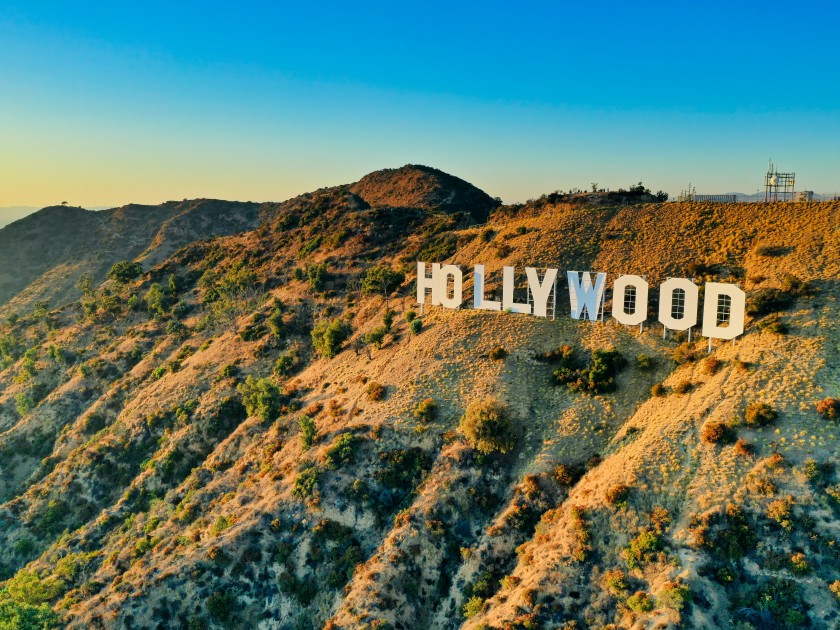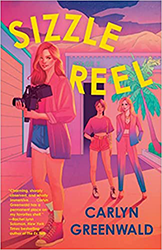
Hollywood Hills, Photo by Venti Views via Unsplash
I didn’t fully engage with Judaism until I started writing stories. I was raised Reform Jewish — baby naming, Hebrew school, bat mitzvah, most of the holidays — but because my mother is Catholic, I’ve always occupied a strange place in the community. After my bat mitzvah, I practiced less, which stripped Judaism down to more of an internal feeling I often didn’t think about.
Then there was Hollywood. I spent the first six years of my post-high school life deep in the film industry, learning its history in college, writing screenplays, working in production and managers’ offices. It was incredible to see the number of Jewish last names scattered across IMDB — producers, actors, directors — while so rarely seeing the Jewish experience depicted on-screen. As diversity became a priority for executives, it was grossly fascinating to see that despite Jewish people being a historically marginalized community, they “didn’t count” in Hollywood. As if there was no need for more Jewish stories.
When I set out to write Sizzle Reel, a queer adult romcom following a talent manager’s assistant as she comes out as bi at age twenty-four and tries to “make up for lost time” by seducing an ambiguously gay A‑list actress, I wanted to talk about Judaism and Hollywood in some way. I’ve always included Judaism in my works in some way — by featuring Jewish protagonists or holidays, or just by avoiding Christian iconography and values. But approaching Judaism through the lens of Hollywood and its history was new creative stomping ground. Would my protagonist have found inspiration in Jewish cinema? Which Jewish films was I most inspired by? There are so many incredible films molded by Jewish hands, yet it’s difficult to conjure long lists of films that feature Judaism itself. So I made myself a map to inform how I wrote my protagonist, drawing on my own life experiences and movies I’d seen. These are the ones that affected me the most:
The Prince of Egypt (1998)
The quintessential Pesach movie for children, this film has a purity that brings me back to Hebrew school, a world without Christians, and a mythology completely Jewish. This sensation always hits me during the first song, “Deliver Us.” The Jewish slaves are singing a prayer, and I instinctually hear Elohim, adonai. Interestingly, consulted rabbis told the creators to refrain from using the actual term for Hashem, replacing it with God on high. But it feels like a little whisper to only the Jewish viewers—You know what the characters are actually saying. Every time I rewatch this scene, I feel more Jewish.
Cabaret (1972)
I first encountered this film in a movie musical class my sophomore year of college, having been familiar with the stage musical written by Jewish songwriting team John Kanter and Frank Ebb. Although the main characters aren’t Jewish, the writers’ vision felt particularly resonant to me. To me, this movie celebrated those who would ultimately be killed in the Holocaust more than anything. It showed how people were just living their lives and would do anything to ignore the looming darkness. To this day, this film feels uncomfortably relevant — the bigotry felt by everyday people is all around us and seemingly perpetual. Cabaret has always felt like a safe space to feel that unease living as a Jewish person and knowing my people’s history.
Disobedience (2017)
This movie was part of a wave of emotional sapphic dramas set in either niche or historical communities. Starring Rachel McAdams and Rachel Weisz, it tells the story of two women in an ultra-Orthodox community — one who left, one who stayed — as they struggle with their forbidden love for one another. While this movie depicts a patriarchal sect of Judaism quite different from my own Jewish community, there is still something comforting about seeing Judaism depicted across the scale of progressivism. At a time when I was questioning my own sexuality, it was a vivid reminder that Judaism isn’t only for straight folks. Even if the fundamentalism wasn’t familiar to me, the prayers, the temples, and the Hebrew were. Seeing two Jewish women in love with each other, in lust with each other — it felt special even if the story didn’t end the way I would’ve wanted.
Blackkklansman (2018)
By all accounts, Spike Lee and Adam Driver aren’t Jewish, but empathy among marginalized groups is depicted so beautifully in this film. Driver’s character, an Anglo-passing Jewish cop who has to infiltrate the KKK with his Black fellow officer, gives a speech that has moved me more than anything else in the past decade of cinema. He talks about how he lived a life with Judaism on the periphery — he knew he was Jewish, but he didn’t talk about it, didn’t celebrate many holidays. But as he’s faced with the vile antisemitism of the KKK sect, he has been thinking about being Jewish so much more. Before watching Blakkklansman, I’d never seen my own feelings about Judaism depicted that way before, to a T. It’s awful to think that many Jewish people reconnect with their identities only because of growing bigotry, and I think this movie knows it. Blakkklansman has inspired me to no longer let Judaism fall by the wayside, but rather, to find Jewish joy and belonging before another tragedy strikes.
Shiva Baby (2020)
Shiva Baby is one of the most stressful movies I’ve seen in years. It’s also intrinsically Jewish. Following a bisexual young Jewish woman as she attends a family friend’s shiva where both her ex-girlfriend and current, married sugar daddy are present, this film feels both universal to meddling communities and the ultra-specific energy of any Jewish gathering. The way, Are you having children, Is your boyfriend Jewish, and What do you do for work are universal, but also speak to the Jewish anxiety about perpetuating our people. It’s the conundrum of a Jewish twenty-something struggling, along with every other twenty-something, against a tapestry of bagels and Yiddish. Since so many Jewish films revolve around Jewish history, it hit even harder to see a Jewish character’s anxieties closer to my own everyday experience as a bi Jewish twenty-something depicted onscreen.
There will never be enough Jewish films, and I hope their number will continue to grow across genres — fantasy, horror, romcoms. I’m grateful for the Jewish writers who’ve come before me, and I can’t wait for readers to hopefully see parts of themselves in both Sizzle Reel’s depictions of an anxious, Jewish bisexual, and in her experience of breaking into Hollywood as a Jew.
Carlyn Greenwald writes romantic and thrilling page-turners for teens and adults. A film school graduate and former Hollywood lackey, she now works in publishing. She resides in Los Angeles, mourning ArcLight Cinemas and soaking in the sun with her dogs. Find her online on Twitter @CarlynGreenwald and Instagram @carlyn_gee.
